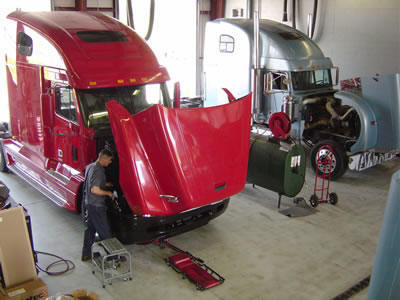5 Ways to Increase the Efficiency of Your Fleet

Managing a fleet is difficult. There are expenses to control, vehicles to maintain, and a staff to keep safe and on-task. This leaves little room for error. For fleet managers to stay on budget and keep their operation rolling they need to make their fleet more efficient.
Proactively addressing maintenance issues, managing tire and fuel costs, reducing paperwork and using new technology can help make your fleet more efficient.
Perform Preventative Maintenance
The key to any fleet operation is keeping your vehicles on the road. Performing preventative maintenance can help you address minor issues early before they lead to bigger problems, and potentially breakdowns. PM allows you to schedule your fleet for routine services (like oil changes, fluid refills, and tire and hose inspections) in advance, allowing vehicles to be serviced when it’s convenient for the fleet.
Performing regular maintenance on vehicles can actually save your operation time. It’s estimated that 3 to 8 hours of work are saved for every 1 hour of PM. Regular preventative maintenance also allows fleets to better track a vehicle’s parts usage and warranties. For fleet’s using fleet management software, vehicle history and work orders can be updated in real-time during the scheduled services.
Enhance Tire Management
Tires are more than equipment – they are assets, and they should be managed as such. As most fleets’ third-largest operating cost (behind fuel and payroll), tires need proper care to maximize their lifespans. Set up regular tire maintenance appointments to rotate the tires and check alignment. Tread, inflation and overall usage can also be checked during these service appointments.
Following a tire management program will allow you to better track the cost of each tire by miles traveled and overall performance. If effective, a properly run tire management program can end up saving your fleet money on fuel and tire replacement costs.
Increase Fuel Management
Controlling fuel costs is one of the most important aspects of any fleet operation. It’s crucial to know how much fuel your vehicles are using and how that impacts your budget.
Several factors can cause fleets’ fuel costs to go over budget, and while some are out of your control – like fuel prices – many are manageable. Using GPS tracking devices to ensure drivers are taking the most fuel-efficient routes is one way to manage costs. Tracking vehicle idling time and overall driving behaviors can also help keep your fleet on budget.
Another way to better manage fuel expenses is to use fleet management software. Many solutions, like RTA’s, can connect directly to a fuel management platform. This makes transactions available in the platform, allowing fleet managers to easily access the information.
Transfer to Paperless modules
Why create more paperwork than is necessary? Filling out paper forms is time consuming for you and your technicians, and it creates room for error. What happens if a technician records his or her hours incorrectly? What if a document gets lost? Going paperless and instead accessing data through a software solution will help improve the efficiency of your operation.
Fleet management software can allow technicians to allocate time to specific projects automatically, and gives them access to important information about vehicles and equipment. Instead of looking for paperwork that contains warranty information or vehicle history, he or she can access it via the software. The technician can document all details from the services performed in real-time, ensuring he or she doesn’t forget to enter key information later.
Embrace Telematics
Technology is benefiting fleet operations. Advances in GPS tracking and telematics gives you more insight into the exact locations of your vehicles, driver behavior and overall vehicle performance.
Telematics can help you identify bad driving behaviors like speeding, sudden braking or accelerating, and idling. It also helps identify road or traffic conditions to enable drivers to be rerouted. This can help you not only improve the safety of your drivers, but also cut down on fuel expenses.
Telematics also helps alert fleet managers and drivers to potential issues with the vehicle. The technology can identify urgent issues, or find issues that should be addressed during the next scheduled preventative maintenance service.
To learn more about how RTA Fleet Management Software’s solution can increase your fleet’s efficiency, request a free demo today.


